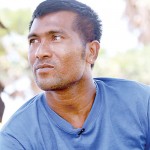News
Asylum-seeker returns with shattered dreams
For the past two years, Vaithilingam Linagaraja, a fishermen from Kaddaikadu off Elephant Pass in Jaffna, had been languishing in a refugee camp in Paula New Guinea after his bid to illegally enter Australia failed.

Vaithilingam Linagaraja back home with family at Kaddaikadu off Elephant Pass in Jaffna. Pix by T. Premanath
Mr. Linagaraja last week voluntarily decided to return home after realising he had no chance of entering Australia.
“I realised that I had wasted two years inside a camp while my family – wife, four children and two sisters – were suffering back at home,” he told the Sunday Times.
“I’d been determined to leave Sri Lanka at any cost, hoping for a better future for my family and the education of my children,” he said.
“But now I have to start my life from zero. There is nothing left for me to hang on to. When I think of my family, I don’t know where to start – I almost lost my whole life in these last two years.”
In March 2013, Mr. Linagaraja left for Batticaloa to meet a sub-agent who has been arranging passage to Australia for those interested.
In Batticaloa he met the main agent, Niranjan. For the next four months he stayed in different places in Batticaloa and then was moved to Colombo along with 12 others wanting passage to Australia.
Towards the end of 2013 he and the other 12 people were taken to Hambantota in a van. That same night, along with another batch of 26 people, they were boarded onto an unseaworthy fishing trawler off the Hambantota coast. The trawler had a crew of six.
“We had a heated argument with the crew about the danger of sailing while Navy patrols were standing by a couple of kilometers away,” Mr. Linagaraja said.
“They told us that this ‘business’ is happening with their help. One said, ‘They are helping us with a Navy torch that shows our route clearly’.
“It took us 24 days to reach Christmas Island. There were 10 children and six women in the trawler. During the whole sea passage we had cunjee (rice soup) three times a day.”

Vaithilingam Linagaraja: Hopes to return to his old profession, fishing
When the boat reached Christmas Island, an Australian territory off the mainland, the Australian Navy surrounded the trawler and boarded it.
“We were questioned by the Australian Navy for several hours,” Mr. Linagaraja said. “They gave us food, water bottles and bedsheets.
“In our boat there were 68 people, from Jaffna, Kilinochchi, Mannar and Trincomalee. Of them, 44 were immediately deported to Sri Lanka.”
After two years of detention on Manus Island in Papua New Guinea Mr. Linagaraja’s plea to enter Australia as a refugee was rejected as his claims of persecution were not held to be well-founded.
“They decided to reject my plea after two years of suffering in the camp,” he said.
“When it was clear that I won’t be allowed to Australia I decided to return. I gave a letter to United Nations (UN) officials that if anything happened to me they would be responsible for that.”
The refugee camp on Manus Island was filled with 1600 asylum-seekers from various countries such as Iran, Iraq, Afghanistan, Nepal, Bangaladesh, India, Sri Lanka, and Africa, he said.
The detention camp has 20-foot fences surrounding the temporary shelters in which the asylum-seekers were housed.
“They put us in there and abused us – not physically but mentally. Many have ended up with mental problems. There are mentally unfit people are wandering round the camp. Had I stayed a bit longer I would have ended up in a similar situation.”
Mr. Linagaraja said medical facilities in the camp were poor. “When an Iraqi national injured his leg they gave the wrong medicines to him. He died in the following days after being declared brain-dead. There was no one else to look after us. Around 25 persons died like this.
“I thought that if I returned I would be able to spend my life with my children, so I decided to return.
“I have to start a new life for my family. I don’t know where to start.”
His family is still struggling to complete the construction of their house, which was started with help from NGOs. His relations and other villagers lent a huge sum of money for his passage and now he has no idea how to repay those debts. He paid around Rs. 1 million to the agent for his passage to Australia.
Mr. Linagaraja registered with the International Organisation for Migration (IMO) before he left Manus Island and will receive a Rs. 300,00 grant from the body to get back into employment.
The debts he incurred to pay for his ill-fated voyage outweigh the IMO grant.
“This is the price I paid for the dream to reach Australia,” he said.
Mr. Linagaraja now hopes to return to his old profession, fishing. He needs to earn enough not only to look after his family but also to pay back his loans.

